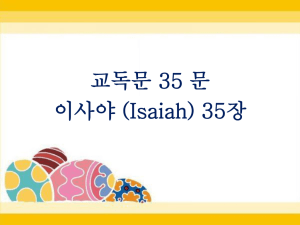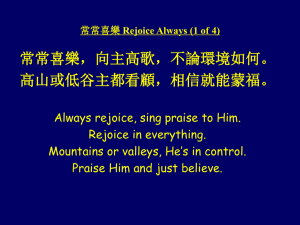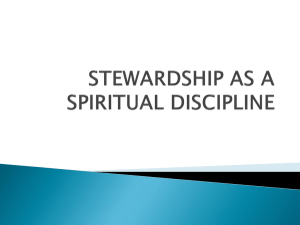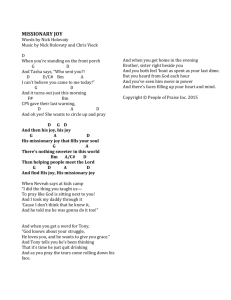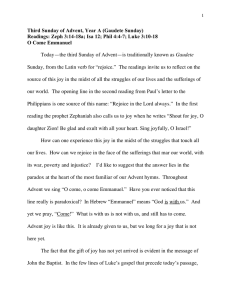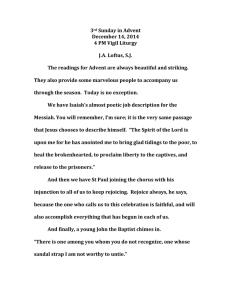Third Sunday of Advent, Year B (Gaudete Sunday)
advertisement
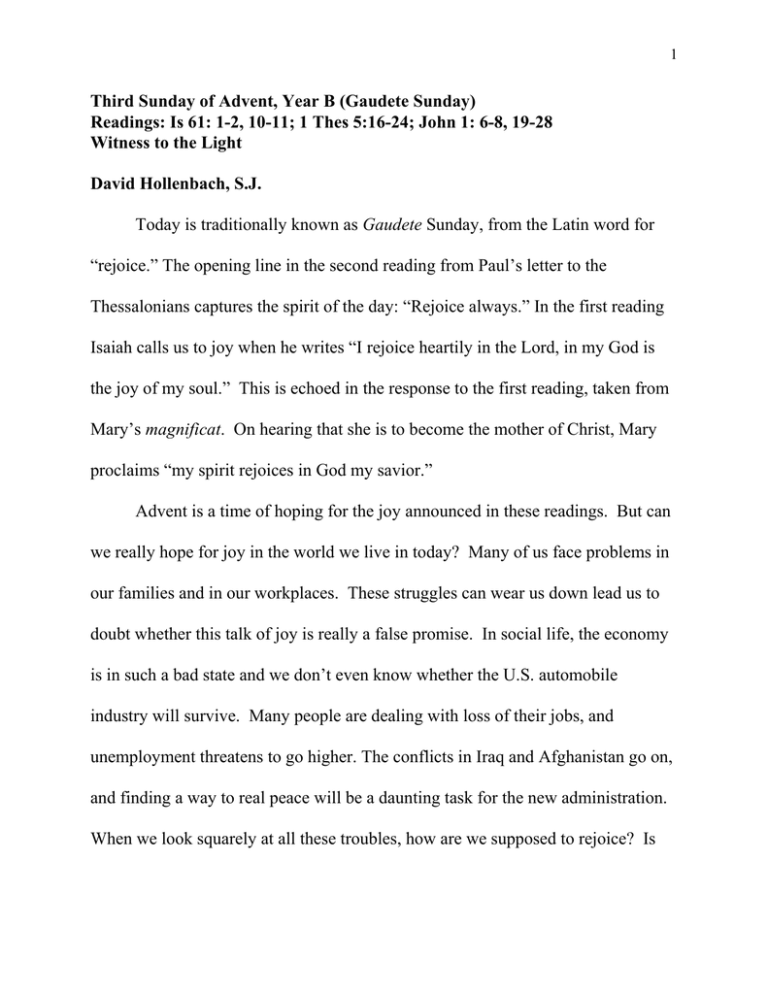
1 Third Sunday of Advent, Year B (Gaudete Sunday) Readings: Is 61: 1-2, 10-11; 1 Thes 5:16-24; John 1: 6-8, 19-28 Witness to the Light David Hollenbach, S.J. Today is traditionally known as Gaudete Sunday, from the Latin word for “rejoice.” The opening line in the second reading from Paul’s letter to the Thessalonians captures the spirit of the day: “Rejoice always.” In the first reading Isaiah calls us to joy when he writes “I rejoice heartily in the Lord, in my God is the joy of my soul.” This is echoed in the response to the first reading, taken from Mary’s magnificat. On hearing that she is to become the mother of Christ, Mary proclaims “my spirit rejoices in God my savior.” Advent is a time of hoping for the joy announced in these readings. But can we really hope for joy in the world we live in today? Many of us face problems in our families and in our workplaces. These struggles can wear us down lead us to doubt whether this talk of joy is really a false promise. In social life, the economy is in such a bad state and we don’t even know whether the U.S. automobile industry will survive. Many people are dealing with loss of their jobs, and unemployment threatens to go higher. The conflicts in Iraq and Afghanistan go on, and finding a way to real peace will be a daunting task for the new administration. When we look squarely at all these troubles, how are we supposed to rejoice? Is 2 all the talk of joy in today’s liturgy really a false promise that can be taken seriously only by people who are just plain naive? Fortunately, the hope proclaimed in today’s readings is not a naïve optimism that pretends that there are no serious problems facing us. Isaiah’s words promising joy were first spoken when the people of Israel faced very tough conditions. They had recently returned from exile in Babylon and things were not going as well as they had hoped. Their city of Jerusalem had been destroyed. They were very poor. Some of them wondered whether being exiles back in Babylon might not have been a better deal. In the same way, in our response to the first reading, Mary’s magnificat is a song of hope. But she sings of captives will be freed, of hungry people who will have enough to eat, of people smashed down by injustice and oppression who will be raised up. Mary knew all about the struggles of the poor since she was herself poor, just as Isaiah knew about the continuing struggles of captives and exiles since he lived that reality himself. Where does their hope come from? John the Baptist in the gospel gives us a clue. John is described as a “witness” who came in the midst of darkness to “testify to the light.” The Baptist comes to help people see glimmers of light in the darkness—enough light to enable them to hope a new day will soon dawn. At the deepest level, John is a witness to the reality of who God is. He has come to know 3 that though God is often hidden from us in shadows and even darkness, God is truly the One in whom we can trust, even when things are not going well. The ultimate reality we face is not darkness or meaninglessness. The ultimate—the one true God—is a God of light and meaning and hope. The Baptist uses the words of Isaiah to describe how God help him see glimmers of light that showed him that God is light. He can hope in God to fulfill his deepest longings. “The spirit of the Lord GOD is upon me, the Lord GOD has sent me to bring glad tidings to the poor, to heal the brokenhearted, to proclaim liberty to the captives.” It is the Lord GOD that inspires Isaiah’s and John the Baptist’s and Mary’s hope. For all three of them have been given some glimpses into the deepest reality of things, where they see that God is a God of light, not darkness, John tells us he has come as a witness to this light. He is here to help us see that in Jesus, the final witness and revealer of who God is, the light of God is breaking through the shadows over our lives and world. The God Jesus shows us heals broken hearts, so if our hearts have been broken we can hope in this God. The God of Jesus brings fullness to the poor, so if we face unemployment or financial loss we can trust that this is not the final word. Even in the face of the darkness of death, God promises us the light of eternal life. There are glimmers of that light in our lives right now. As we turn to the table of 4 the Lord today let’s ask that we can see these lights of hope more clearly, and come to experience the joy of God’s coming among us in Jesus at Christmas. David Hollenbach, S.J. St. Ignatius Church December 14, 2008
